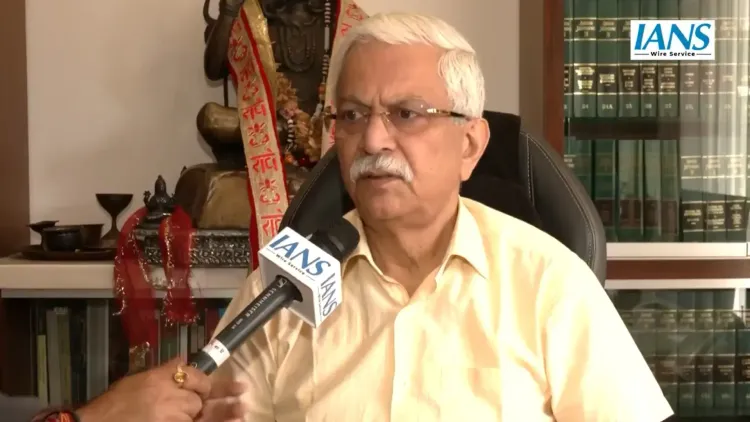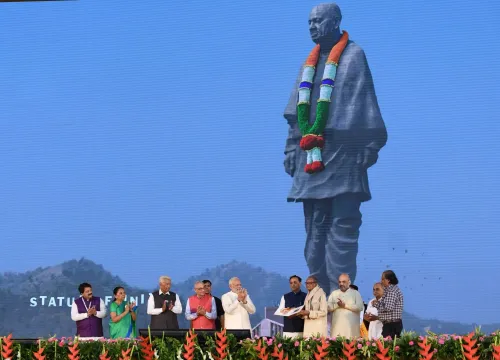Governor's Actions in Tamil Nadu Case Indicate Malicious Intent: Supreme Court Ruling is a Win for the Constitution, Says Advocate Rakesh Dwivedi

Synopsis
Key Takeaways
- The Supreme Court declared ten withheld bills as law.
- The Governor's conduct violated Article 200 of the Constitution.
- Rakesh Dwivedi represented the Tamil Nadu government.
- The ruling is a significant win for constitutional integrity.
- Subsequent actions by the Governor were deemed invalid.
New Delhi, April 12 (NationPress) The standoff between the Tamil Nadu government and Governor R.N. Ravi regarding the delay in granting assent to bills has reached a resolution thanks to the Supreme Court.
In a significant ruling, the apex court declared that the ten bills that were held back by the Governor since 2020 are now automatically enacted as law.
The court also characterized the Governor's conduct as a breach of the Constitution, particularly violating Article 200.
Senior Advocate Rakesh Dwivedi, who represented the Tamil Nadu government in this case, shared exclusive insights with IANS regarding the developments and ramifications of the Supreme Court's ruling.
He mentioned that the verdict was delivered in light of the exceptional circumstances in Tamil Nadu.
“Ten bills were passed by the state legislature and submitted to the Governor for assent. However, he delayed action on them for over a year,” Dwivedi clarified. During this timeframe, a related situation emerged in Punjab, prompting the Supreme Court to elucidate the interpretation of Article 200.
Dwivedi clarified: “The court determined that when a Governor receives a bill and opts not to assent to it, they must return it to the legislature with a message for reconsideration. If the legislature re-passes the bill, the Governor is then obligated to provide assent. At that point, discretion is no longer applicable.”
He also noted that the Tamil Nadu issue was concurrently pending before the Supreme Court. During hearings, the Attorney General suggested resolving the matter through dialogue with the Governor. However, the Governor neither approved the bills nor forwarded them to the President, instead returning them with the statement, “I do not give my assent.”
Subsequently, the Tamil Nadu Assembly re-passed the bills and sent them back to the Governor, who then forwarded them to the President for consideration. Dwivedi asserted, “This sequence of actions clearly indicated the Governor’s bad faith.”
“Holding the files for a year, disregarding the Supreme Court’s ruling in the Punjab case, and obstructing all ten bills without justification demonstrate malintent,” Dwivedi stated.
“When the bills were re-passed, the Governor should have granted assent as mandated by Article 200. Referring them to the President was unconstitutional,” he added.
He further remarked: “A Governor cannot assert, ‘I will stop it again’ or ‘I will send it to the President again.’ The Constitution requires that if a bill is re-passed, the Governor’s discretion is eliminated. The language in Article 200 is unequivocal - ‘assent shall not be withheld.’ Therefore, once re-passed, a bill cannot be denied.”
Dwivedi noted that the Supreme Court found the Governor’s actions to be in violation of Article 200 and invalidated them.
“When the initial action is nullified, any subsequent actions, such as sending the bills to the President, also lose their validity. If the foundation is removed, the structure collapses.”
It is noteworthy that the ten bills in question were passed by the Tamil Nadu Legislative Assembly - some during the tenure of the previous AIADMK government and others under the current DMK government.
Governor R.N. Ravi, however, withheld his assent for a prolonged period without providing a decision. After being re-passed by the Assembly, he again refused assent and forwarded them to the President.
The Tamil Nadu government contested this action in the Supreme Court, arguing it was arbitrary and unconstitutional. The court’s judgment made it clear that the Governor’s conduct was contrary to Article 200 of the Constitution and that obstructing or indefinitely delaying bills approved by the legislature is incompatible with the constitutional responsibilities of a Governor.









